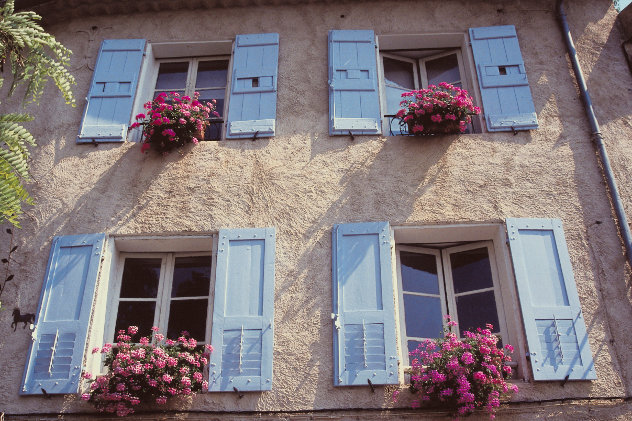Will it be a moonlighter or an artisan?
Wouter Haaijman, Friday, 1 March 2019

Do you have a house in France that needs to be renovated? If you do not want to do that yourself or do not have the knowledge, you will have to hire someone. Finding an excellent craftsman and explaining what needs to be done in French is not easy, even if you speak French quite well. In Great Britain, it is already challenging to assess a quotation accurately, but a quote in French (a 'devis') is even more difficult to understand.
It is therefore quite understandable that you are considering joining forces with an English person who already lives in France. That is so much easier to talk to. However, these are often do-it-yourselfers, (former) construction workers, plumbers, etcetera. Many offer themselves as craftsmen because they have to earn something. That is fine as long as they have the necessary knowledge and experience and comply with the French building regulations and rules. This means using materials that meet French standards and are registered with the Chambre des Métiers. Unfortunately, these rules are often flouted. Also, they are usually not insured. A craftsman is recognized if he is registered with the Chambre des Métiers and is insured.
So you can start by checking whether the person to whom you want to entrust your renovation is registered with the Chambre des Métiers. If he can show you an 'extrat k/k-bis,' that's fine. A craftsman also has liability insurance. This is important because it gives you better protection in case something goes wrong. The guarantee on the activities of the craftsman is covered by his insurance. Therefore it is wise to always ask for the 'extrat k/k-bis.'
Many foreigners think that all artisans are French and therefore choose only one moonlighter who speaks their language. This is really not necessary because in France are also non-French artisans active, who can help you with a renovation. It is wise to base the choice of an artisan on more in- depth research than what you have heard from the bed and breakfast owner or the real estate agent on your last visit to France. 'On se connait' is essential in the French countryside, but an acquaintance of an acquaintance is not enough ground for the choice of an artisan. It often involves large sums of money, not to mention the happiness of your life in France. Prices differ, of course, and one artisan does a better job than another. Therefore, ask at least three artisans for a quotation and check references at an early stage. Viewing delivered work is a necessity. If possible, choose the recommendation of a customer who is also a foreigner.
The offer
Make sure that your request for quotation is well structured by specifying exactly and in detail what needs to be delivered. A good artisan will ensure that he understands what you are asking for and will then issue a real quote. He uses the professionals needed for specific work, the right materials, calculates the correct TVA percentage (which depends on the type of work), and proposes a price that is in proportion to what he will deliver. If you are not an expert yourself, you can have the quotations assessed by someone who is. Such expertise can save you a lot of money and misery. A well-known trick of dishonest artisans (and of moonlighters) is to include hidden extra work or not mentioning extra work that later, as a surprise, emerges. Of course at the moment that the renovation is so advanced that you can not go back. A craftsman will ask the client to sign the quotation to indicate that it has been accepted. Payment terms are laid down in the quote.
The moonlighter. It is much cheaper!
A moonlighter seems cheaper than an artisan. For some jobs, it doesn't matter. The moonlighter who comes to mow the grass or clean the pool can do little harm. But when it comes to a renovation or restoration, then knowledge and experience are essential. With a moonlighter, you can also ask nothing. Moonlighters do not advertise, and they find it unpleasant to have to answer your questions about qualifications, expertise, and liability. Please note. Some moonlighters claim to be insured and give details of the insurance. Please note that the coverage applies specifically to the work he is going to do.
Using a moonlighter can have far-reaching consequences. You can lose a lot of money on repairs, you can get problems with the municipality because of incorrect execution of the building permit and in the most severe case you can stay with an inferior house that later turns out to be unsaleable. A technical inspection carried out by a buyer will irrevocably reveal the defects. In the end, a moonlighter can cost much more than you would ever have had to pay an artisan.
Moonlighters know how to convince people who have just arrived in France. You are easy prey. They will welcome you, and in a few weeks and after a few bottles of wine a close friendship will develop. The decision as to who will do the work is then simple, especially as the offer is relatively low. The customer only later finds out that in a few weeks you will not become friends and that the saying "you get what you paid for" also applies in France.
We wish you a lot of fun and creativity in planning the renovation of your French house. And a dose of wisdom and healthy distrust before you entrust the execution of these plans to anyone.

Do you have a house in France that needs to be renovated? If you do not want to do that yourself or do not have the knowledge, you will have to hire someone. Finding an excellent craftsman and explaining what needs to be done in French is not easy, even if you speak French quite well. In Great Britain, it is already challenging to assess a quotation accurately, but a quote in French (a 'devis') is even more difficult to understand.
It is therefore quite understandable that you are considering joining forces with an English person who already lives in France. That is so much easier to talk to. However, these are often do-it-yourselfers, (former) construction workers, plumbers, etcetera. Many offer themselves as craftsmen because they have to earn something. That is fine as long as they have the necessary knowledge and experience and comply with the French building regulations and rules. This means using materials that meet French standards and are registered with the Chambre des Métiers. Unfortunately, these rules are often flouted. Also, they are usually not insured. A craftsman is recognized if he is registered with the Chambre des Métiers and is insured.
So you can start by checking whether the person to whom you want to entrust your renovation is registered with the Chambre des Métiers. If he can show you an 'extrat k/k-bis,' that's fine. A craftsman also has liability insurance. This is important because it gives you better protection in case something goes wrong. The guarantee on the activities of the craftsman is covered by his insurance. Therefore it is wise to always ask for the 'extrat k/k-bis.'
Many foreigners think that all artisans are French and therefore choose only one moonlighter who speaks their language. This is really not necessary because in France are also non-French artisans active, who can help you with a renovation. It is wise to base the choice of an artisan on more in- depth research than what you have heard from the bed and breakfast owner or the real estate agent on your last visit to France. 'On se connait' is essential in the French countryside, but an acquaintance of an acquaintance is not enough ground for the choice of an artisan. It often involves large sums of money, not to mention the happiness of your life in France. Prices differ, of course, and one artisan does a better job than another. Therefore, ask at least three artisans for a quotation and check references at an early stage. Viewing delivered work is a necessity. If possible, choose the recommendation of a customer who is also a foreigner.
The offer
Make sure that your request for quotation is well structured by specifying exactly and in detail what needs to be delivered. A good artisan will ensure that he understands what you are asking for and will then issue a real quote. He uses the professionals needed for specific work, the right materials, calculates the correct TVA percentage (which depends on the type of work), and proposes a price that is in proportion to what he will deliver. If you are not an expert yourself, you can have the quotations assessed by someone who is. Such expertise can save you a lot of money and misery. A well-known trick of dishonest artisans (and of moonlighters) is to include hidden extra work or not mentioning extra work that later, as a surprise, emerges. Of course at the moment that the renovation is so advanced that you can not go back. A craftsman will ask the client to sign the quotation to indicate that it has been accepted. Payment terms are laid down in the quote.
The moonlighter. It is much cheaper!
A moonlighter seems cheaper than an artisan. For some jobs, it doesn't matter. The moonlighter who comes to mow the grass or clean the pool can do little harm. But when it comes to a renovation or restoration, then knowledge and experience are essential. With a moonlighter, you can also ask nothing. Moonlighters do not advertise, and they find it unpleasant to have to answer your questions about qualifications, expertise, and liability. Please note. Some moonlighters claim to be insured and give details of the insurance. Please note that the coverage applies specifically to the work he is going to do.
Using a moonlighter can have far-reaching consequences. You can lose a lot of money on repairs, you can get problems with the municipality because of incorrect execution of the building permit and in the most severe case you can stay with an inferior house that later turns out to be unsaleable. A technical inspection carried out by a buyer will irrevocably reveal the defects. In the end, a moonlighter can cost much more than you would ever have had to pay an artisan.
Moonlighters know how to convince people who have just arrived in France. You are easy prey. They will welcome you, and in a few weeks and after a few bottles of wine a close friendship will develop. The decision as to who will do the work is then simple, especially as the offer is relatively low. The customer only later finds out that in a few weeks you will not become friends and that the saying "you get what you paid for" also applies in France.
We wish you a lot of fun and creativity in planning the renovation of your French house. And a dose of wisdom and healthy distrust before you entrust the execution of these plans to anyone.

Search for French property and real estate for sale in all regions of France. Fermettes, gites, houses, B&B’s for sale by owner. Houses for sale in Gironde, Dordogne, Landes, Calvados, Manche and Orne
 Do you want to buy a house in France? Use our checklist to avoid pitfalls and ensure you don’t miss any important steps during the purchasing process.
From legal aspects to financing and construction matters, we’ve covered everything for you.
Do you want to buy a house in France? Use our checklist to avoid pitfalls and ensure you don’t miss any important steps during the purchasing process.
From legal aspects to financing and construction matters, we’ve covered everything for you.